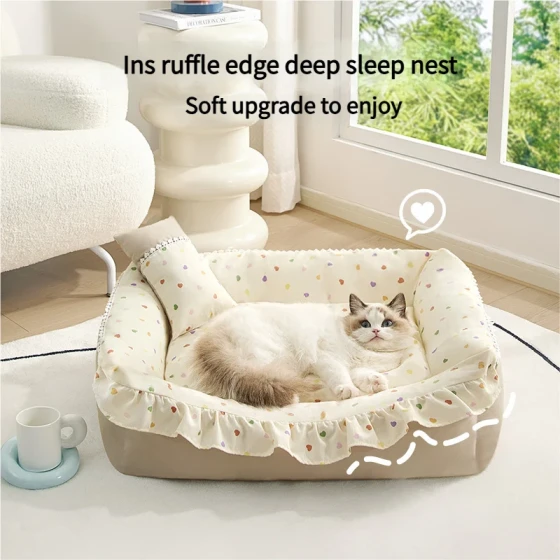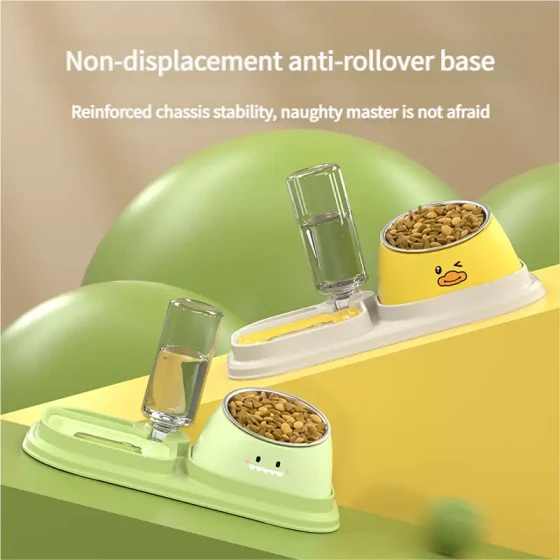How to Soothe a Fluffy Cat

Cats bring us joy but also sometimes show bad behaviors such as scratching furniture, chewing plastic, jumping on counters, and urinating everywhere when stimulated or emotionally disturbed. Cat owners often complain about these issues and feel frustrated. However, with training, you'll be surprised to find these behaviors easily corrected. If a cat has a very bad temper, the owner should also find ways to adjust the cat’s emotions to make it more docile and peaceful.
When your own cat is bad-tempered, consider finding it a feline companion so that when it is bored or angry, it has a friend to play with, which temporarily helps it forget its unhappiness and calms its bad temper.
To deal with a cat's bad temper, the owner must first maintain a calm and peaceful attitude to establish a friendly impression with the cat. Or when the cat looks upset, try playing some soothing, gentle music to help the tense cat relax, reduce its aggressiveness, calm its agitated mind, and stabilize its mood so it no longer angrily treats other pets and owners.
So what are some good solutions for specific bad behaviors caused by cat mood swings?
1. Howling at midnight
This is a serious problem! Many people ask us, "How can I get my cat to sleep at night?" or "Why does my cat always wake me up at night?" For this, we can only say buy them lots of toys. Cats’ sleep-wake cycles differ from humans because they are based on their natural hunting instincts. Cats are most active after dusk and before dawn. But remember, night crying can also be a sign of anxiety, dementia, or getting lost. If your cat is healthy, here is what you need to do. If your cat sleeps all day, don’t blame it for being energetic at night. During the day, you can simulate hunting with it, play together, or go for walks. Another tip: when it wakes you up, do not give it too much attention. The more you respond, the louder they call. The best method is to ignore it.
2. Jumping on tables and counters
While many of us don’t mind this behavior—some even like their cats to have kitchen adventures—regardless of hygiene concerns, you should worry about the cat accidentally eating harmful food.
So what should cat owners do? Climbing and exploring high places is a cat’s nature, so you need to replace counters with something better suited and more attractive for climbing. Buy a cat climbing frame or a window cat hammock and place interesting toys or position it on a window where birds can be seen. These are more attractive than boring counters.
3. Scratching furniture
Are the scratches on your sofa made by your cat? Scratching is how cats stretch their muscles, mark territory, or sharpen claws. The solution is similar to above: don’t stop them but redirect. Cover furniture with double-sided tape and buy your cat fun horizontal or vertical scratching posts. More importantly, praise and reward them at appropriate times.
4. Urinating outside the litter box
Some bad cat habits can be corrected through training, but others require a vet’s attention. Does your cat urinate on furniture and beds? If this keeps happening, you need to take it to a vet. Friends may tell you your cat is “spiteful”, but this is not true; things may be more serious. Many physical problems cause cats to urinate outside the litter box, including kidney failure, bladder infections, or diseases like diabetes and arthritis. Your responsibility is to inform the vet about what is happening so a proper checkup can be done.
5. Scratching and biting during play
Being scratched or bitten by your cat is no fun, but if you take some responsibility, it wouldn’t happen. When playing, cats get excited easily and instinctively show their teeth and claws. This is common. Many people pull back their hands abruptly or immediately hit the cat to stop the behavior. Actually, this reinforces their reactions. The solution is simple: stop using your hands, redirect their attention with feathers or toys. This is natural for cats and non-aggressive, and your hands won’t get scars. If they continue attacking, contact a vet.
6. Chewing plastic and other strange objects
You might think chewing plastic or carpets is a cat’s weird behavior, but it is actually a disorder. Chewing non-food items is called pica and can cause dental problems, gastrointestinal diseases, and anxiety. If your cat has this habit, call a vet.
Additionally, when soothing cats, keep in mind:
1. Do not use violence
Many people understand this well. No animal likes to be hit or scolded; violence is especially detested. Once abused, great psychological shadows form, which might hugely affect the cat’s life and make it lose trust in humans.
2. Cats do not like to be supervised closely
Cats are very independent; they usually like to be quiet and live like elderly people in their later years—free and uninhibited. Therefore, it is best not to force cats to do things they dislike. If you limit your cat’s freedom or cage it, it could become excessively sad and depressed, even leading to a gloomy life and eventual death.



